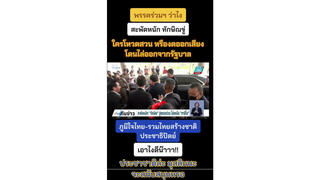
Have Chinese scientists been experimenting with a new coronavirus called GX-P2V that could lead to a new pandemic? No, that's not true: GX-P2V had already been discovered in pangolins in 2017 before the COVID-19 pandemic started in 2020. A study conducted by Beijing University scientists, released as a pre-print in January 2024, has been misinterpreted, according to one of the authors, who clarified that their research does not prove that GX-P2V is dangerous to humans.
The claim appeared in a video (archived here) that was published on TikTok by @hally264 on January 25, 2024, with a caption, translated from Thai into English by Lead Stories staff, that read:
Have you ever heard about the new coronavirus GX-PV2 that Beijing scientists are experimenting with?
The TikToker also says at the 1:04-minute mark, translated from Thai to English by Lead Stories staff:
We hope it will not spread from the lab and do harm to humans in the world.
This is what the post looked like on TikTok at the time of writing:
(Source: TikTok screenshot taken on Thu Feb 8 11:47:45 2024 UTC)
According to a report by NDTV World (archived here), China is conducting experiments with a virus called GX-P2V on humanized mice. The report is based on a study by the Beijing University of Chemical Technology, which was published as a preprint on January 4, 2024 (archived here) that has not been peer-reviewed. This study was incorrectly interpreted to suggest that scientists had created a mutation of the coronavirus strain that killed 100 percent of the test animals and could spread to humans. This claim was widely shared on social media, for example in the TikTok video mentioned above.
The authors updated the preprint on January 21, 2024, (archived here) to react to the misinterpretation, and co-author Lihua Song had already explained in a comment on January 17, 2024 (archived here) that the study was largely misinterpreted, and that it does not prove that GX-P2V is dangerous to humans: "The ACE2 humanized mice used in our experiments are unique and do not exist in nature. The outcomes from these tests cannot be applicable to humans," he stated.
Furthermore, the Thai state-owned Anti-Fake News Center confirmed (archived here) that this virus was discovered before the COVID-19 pandemic, in 2017, and that there is no risk of a new pandemic due to GX-P2V. It says, translated from Thai to English: "According to this research, the GX-P2V coronavirus is not a new virus and not a new COVID strain."











